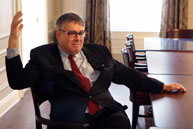Great Scott!
A glimpse of the man behind the new Stephen Allan Scott Seminar Room
On Friday, November 3, a beautifully renovated room in the Faculty of Law's Old Chancellor Day Hall was christened the Stephen Allan Scott Seminar room. An assortment of judges, faculty, practitioners and students was on hand to witness the rebirth of the room, the walls of which are now adorned with tributes to past McGillians of prominence, chosen mostly by Professor Scott himself; the man behind the room.

Professor Stephen Scott looking right at home in the room that bears his name.
Owen Egan
At the Faculty of Law, Stephen Scott is a legend. Remarkably, this year is his fiftieth at McGill – he began his General Arts degree in 1957. He officially retired in 2002, but has been appointed professor-emeritus and remains very active at the faculty. For scores of McGill law students, Professor Scott represents their first brush with Canadian Constitutional Law, a subject on which he is a passionate expert.
He is known not only for his expertise on the subject matter he professes, but for a teaching style that was highly unorthodox or highly effective or both, depending on whom you ask. In his teaching days, it was not uncommon to find him covered in chalk, shirt slightly untucked, banging loudly on the walls to emphasize a point. Students were often treated to spontaneous impersonations of judges or political leaders, or even some creative art work on the blackboard (such as the infamous sketch of a "big lumbering brontosaurus" – his description of the federal bureaucracy). Those unlucky enough to be digesting a more subdued lecture in a neighboring classroom would simply be left wondering what all the laughter and loud thumping next door was about.
He had a way of explaining things that is often succinct and witty, leaving you baffled for a moment before realizing that you do in fact have a better understanding of whatever complex matters is at hand. In explaining the difference between a superior court and the Superior Court, for example, Scott boils it down to this: "If you call a man Mr. Carrot, that doesn't make him a carrot."
He readily admits that this style, coupled with his grading methods, made him a controversial figure for students. "I am not universally loved," he states simply, recalling third party accounts of students who still go into convulsions when they hear his name. Perhaps not universally loved, but it is no stretch to suggest he is universally admired.
The controversy surrounding him extends beyond the university environment. His outspoken views have earned him a certain degree of fame with some – infamy with others – in particular with respect his views on unilateral secession. Those opinions even earned him a death threat on a radio call-in show, which he now laughs off, paraphrasing Descartes: "I am threatened with assassination, therefore I am." He has not only stirred important debates, but has contributed profoundly to them, whether acting as counsel on a number of important constitutional cases, or addressing many a parliamentary hearing.
Having achieved notoriety with the legal and political ruling class, it would have been easy to understand a move away from academia. It has in fact been recommended to the Minister of Justice in the past that Scott be appointed a judge, an opportunity he nonetheless turned down to stay at McGill. Today, he does look back on that possibility, not with regret "because I would never have done a lot of the really interesting and useful things I've done or met a lot of the people I've known if I had", but rather to ponder what he would have been like as a judge. His verdict? "If I was difficult then, I would have been impossible after five years and intolerable after ten".
That he stayed is both a great stroke of luck for McGill, and a testament to the importance of this institution. Scott recounts that Winston Churchill, whose French was wanting, once pondered his past and said "Je regarde mon derriere et je vois qu'il est divisé en deux parties." Scott smiles and adds "my derriere only has one partie".
McGill, the 'one partie', has without a doubt benefited immeasurably from Stephen Scott's presence and the work he has done to make this place what it is today.
For all his endeavors outside the classroom, he has certainly left his mark in it. He explains that the best time to write was always after a heated debate in class, recalls with fondness the "zillions of fun exchanges" with students, and concludes "I owe to the student body most of my friends in the world". And when asked if there is one thing he hopes every student took away from his class over the years? "That it was never dull". Rest assured, it never was.

